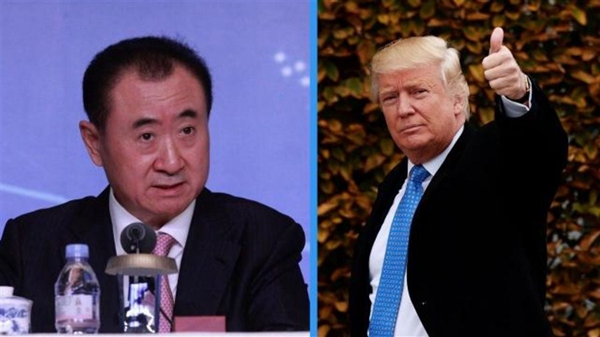
China's richest man, Hollywood investor
Wang Jianlin, has warned Donald Trump against dragging the entertainment
industry into a trade war, saying millions of Chinese movie lovers are
key to the future of cinema.
The billionaire joined a chorus of concern from international business chiefs gathered at the World Economic Forum in the Swiss resort of Davos this week over the protectionist leanings of the US president-elect, who takes office today.
Wang, whose Wanda conglomerate owns a US cinema chain, a Hollywood production company and the firm that runs the Golden Globe awards, said the US would be the bigger loser if the entertainment sector fell victim to a trade war.
“The main growth market of English-language films out of the US is actually China, not anywhere else,” Wang said, noting that China had the most movie screens in the world with 15,000 added in the past year alone.
“If China were to retaliate, it would be bad for both parties so I don’t wish to see that scenario materializing,” he said.
Chinese President Xi Jinping has led calls in Davos for an open global economy, warning earlier this week: “No one will emerge as a winner in a trade war.”
Last month, Wang said that the jobs of his 20,000 US employees would be on the line if the Trump administration mishandled Chinese investment.
The 62-year-old’s acquisitions include the US$2.6 billion purchase of cinema chain AMC in 2012 and Legendary Entertainment, the company behind the “Batman” trilogy, for US$3.5 billion last year.
Several US lawmakers have urged the government to examine the national security implications of such investments in Hollywood if such Chinese “soft power” is allowed to take root.
As China eyes a growing stake in US movie-making, e-commerce billionaire Jack Ma also expressed an interest in further Hollywood investment this week after his company Alibaba bought a stake in Steven Spielberg’s firm last year.
Wang, who has been talked of as a potential buyer of Paramount Pictures, reiterated his interest in buying one of the “big six” Hollywood companies. “These six companies are not in a selling mood,” he said, adding that if they were, “I would be a happy buyer.”
Wang said both China and the US would benefit from more joint movie productions, as these are exempt from China’s tight limits on the screening of foreign blockbusters.
Only 34 foreign films are allowed cinema releases on China’s mainland each year, limiting Hollywood studios’ ability to cash in on a massive potential audience. But “there’s no limit” on co-productions, Wang pointed out.
Legendary’s “The Great Wall,” a monster movie starring Matt Damon, has been billed as the first such blockbuster jointly made by China and the US.
Damon, in Davos to promote his water charity, told reporters he would work on another Chinese project “in a heartbeat.”
“I didn’t feel there was any propaganda to it at all,” he said of the concerns of some US politicians. “It was a good old-fashioned creature feature with a giant international crew, and that was a cool thing to be a part of.”
Given the growing clout of Chinese moviegoers, Wang advised Hollywood to start thinking more about the kind of movies his compatriots want to see.
“Chinese films tend to talk about emotions, relationships with people,” he said. “If Hollywood wants to take up a large market share, they need to learn to cater to Chinese tastes — not just these films about superheroes.”
